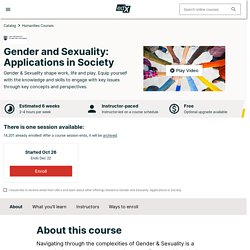

Women Making History: Ten Objects, Many Stories. As we approach the centennial of the passage of women’s suffrage in 1920, there has been a recent burst of activism among American women.

Women are running for political office in record numbers. Women are organizing and taking to the streets to demand change. Women are grappling with inclusion and intersectionality. While some of this activity may have been a response to the 2016 presidential elections, its roots lie deep in 20th-century history — a history richly preservedin Harvard’s Schlesinger Library building on the library’s 75th Anniversary Exhibit. This course exemplifies the importance of archives in themaking of history. Child Protection: Children's Rights in Theory and Practice.
The Best Start in Life: Early Childhood Development for Sustainable Development. What does a successful early childhood care program look like?

How has a child’s brain developed at the age of 3? How does nutrition impact the future well-being of a child into adulthood? Learn the answers to these questions and more in "The Best Start in Life: Early Childhood Development for Sustainable Development". With leading experts in the field – hailing from Harvard University, New York University and UNICEF, among other institutions – we’ll explore how neuroscience, sociology, anthropology and other studies have influenced our understanding of early childhood development.
This course is for: Doing Gender and Why it Matters. Multiple experts from across faculties at The University of Hong Kong and professionals engaged in gender-related developments in Asia will address the ways in which gender is understood, constructed and performed.

Drawing from a variety of perspectives – cultural studies, economics, education, law, linguistics, psychology, public health, politics, social policy, and sociology - we begin by questioning meanings of gender in different cultural settings and historical moments. Introduction to Sociology. Very often we see, hear or experience things that seem "strange" and incomprehensible to us.

We start to wonder about the world around us, asking questions like: “How do certain people become billionaires when others are homeless? Why do humans worship Gods or form families? What makes killing in war acceptable but not in any other situation?” If you have ever wondered about these issues and/or other, you aren’t alone. Similar questions have been asked since the beginning of history, and searching for objective answers using scientific research is the goal of sociology. This course is designed to look critically and analytically through different sociological perspectives, including the functionalist, interactionist, conflict and feminist, to help us realize the extent to which society guides our thoughts and actions. Digital Security and Human Rights. Malware.

Phishing. Data retention. Mass surveillance. We know there are real risks in the digital world, but we don’t always know what to do about them. How do these threats work? This course is a starting place for learning more about digital threats and how to strengthen your security online. You will learn about the key human rights implications of digital security, and you will explore in-depth the right to privacy and the right to freedom of expression.
You will be challenged to assess and reflect on your own practices, take practical steps to improve your online security, and advocate for a rights-respecting digital world. Be prepared for active learning, connecting with course participants from around the world, and becoming part of a global community dedicated to defending human rights through digital security. Malware. Global Politics. This course is part of the IPSAMOOC project, a joint venture Federica Weblearning - IPSA, the International Political Science Association The course explores global order and local disorders to explain why International Studies in the West are moving towards a planetary approach to World politics.

Thinking globally helps explain new links between changes in the natural environment (demographics and climate) and changes in governing Institutions. Will societies and peoples find a way to get along together despite intractable conflicts and divergence of social and national interests? Will States delegate enough sovereignty to universal organizations, rather than keeping power within national borders? Will the world ever be governed, and more democratically governed? Gender and Intersectionality. Week 1 : Gender and Religion Religion impacts us all.

Whether we are believers or non-believers, it is woven into the very fabric of our social, moral, ethical, even political lives. Ethics in Action. Module 1: Introduction to Ethics in Action Chapter 1: Sustainable Development and the Need for Ethics in Action Chapter 2: The History of Sustainable Development and the SDGs Chapter 3: The Moral and Practical Limits of Global Capitalism Chapter 4: Moral Teachings and Sustainable Development: An Overview from the World’s Religions Module 2: Religion and Virtue Ethics - Part I Chapter 1: Lessons from Classical Greece Chapter 2: Lessons from Classical China Chapter 3: A Hindu Perspective Chapter 4: A Buddhist Perspective.

Gender and Sexuality: Applications in Society. Navigating through the complexities of Gender & Sexuality is a necessity in our world, now more than ever.

Engage with globally renowned scholars from top Canadian universities to learn concepts and practices that advance respect and human rights. Religion and Conflict Transformation. Activism and Citizen Journalism through Media. Global Social Change.